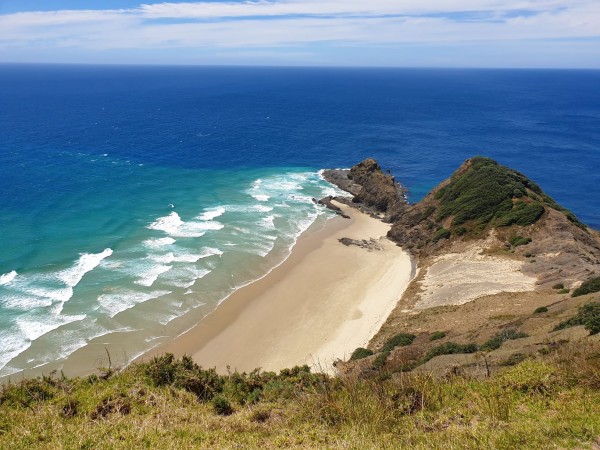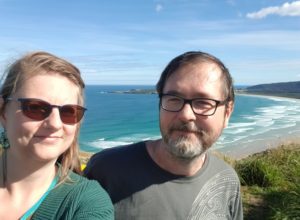My Name is Neelke and I’m a Consultant Psychiatrist working in Whangarei in an inpatient unit for acute mental health care. I came to NZ in October 2020 from The Netherlands. The process to come to NZ took me 1.5 years.
The easiest part of the process was working with our Accent recruiter Kristin who guided us through the whole process and being able to fall back on her for questions and solving problems. Finding a job was also very easy.
The most challenging part of the process was gaining provisional registration with the Medical Council (the process is still going on for getting full registration) and getting our visas sorted in the middle of the covid pandemic. We ended up booking our flights and MIQ just one week before our leaving date. Leaving friends and family behind during the Covid pandemic was probably the hardest part since we are not able to visit them, and it remains unclear when borders will reopen to do so.
My first impressions of NZ were incredibly beautiful landscapes and nature, plants, trees, birds, beaches. We arrived in summer and weather was very pleasant: warm but not too hot as the nights are bringing cool air to refresh. People are relaxed, easy-going, friendly, curious, always in for a chat or lending a helping hand. We soon found out that punctuality is more relaxed too; if someone promises it will be done in 2 days, you might as well think it could easily be 4 or 5 days or not happen at all. Especially in my workplace it is important to follow-up on agreements, send out reminders, check if things were done or not, make sure everyone is clear on what you expect from them: someone saying yes to something does not necessarily lead to a completed task. The no-worries-attitude is palpable in many aspects of life. The houses are, compared to European standards, basic, lacking insulation and heating and prices for rent are very high. The cars are in general much bigger, many people drive SUV's. Public transportation is hardly existing here in Northland. Cycling is a dangerous venture compared to the Netherlands where we have beautiful bicycle paths everywhere: people bike on the same roads where cars can drive a 100 km/hrs: which in our view is risky. The left-side driving terrified me, and it took several months for me to get used to it and feel comfortable driving. NZ society is in general (although as bureaucratic as most developed countries) less regulated in most areas of life. This means greater freedom, but it also means that you cannot rely as much on systems as you can in the Netherlands and that processes are less sophisticated and more often follow a 'one size fits most' approach. Also be aware that it is not possible to buy property right away, something we hadn't realised until only shortly before leaving the Netherlands. This means that for the first years you will have to spend your money at expensive rentals.
Northland is stunning and has an overwhelming amount of natural beauty. It is relatively sparsely populated and there is still real wilderness present. Climate is very pleasant. In winter it rains more, but we are still having many beautiful sunny days when you can be outside in your summer outfit. After having travelled through the South Island in April we came to the conclusion that this might well be one of the most beautiful regions when you are looking for native bush, forests, birdlife, beaches, water sports/fishing options and learning about Maori culture. The South Island has the big mountains and isolated places that are special on their own. Place after place was breathtaking, it really is impossible to say which is better and I guess it depends more on personal preferences.

What I love most about living in NZ is having so many options for outdoors activities, for connecting with nature, for exploring new skills and new hobbies (hiking, snorkeling, diving, sailing, survival skills and so much more). I like Whangarei because of its cultural diversity and its upcoming economy: although traces of poverty are still visible, the region is in full development and has a promising future in my view.
I miss my friends, my family, my previous workplace, cycling, commuting by train, the familiarity of things, liquorice, cheese, shopping.
My advice if you are planning to come to NZ is take your time to do the paperwork, it will ease the stress of having to go through all the processes. We took about 1 hour per day for about a year to research everything and do all the documents. We have had no extreme stress at any point, except for the visa wait which was a result of the pandemic. Things can maybe be done in 6 months time, but it will be far more stressful. Make also sure you leave enough time to say your goodbyes to family and friends and think beforehand of ways to stay in touch with them: you will thank yourself later for that.
Be prepared for going through a culture shock. After the initial excitement about this huge adventure wears off most people go through a period of having adjustment issues and missing home. For me it was helpful to read about this and to realise that flexibility and lowering expectations is key. And finding other people going through similar phases was very good too.
Keep an open mind and an open heart and do not judge other cultures (be it Kiwi, Maori, Pacific Islanders, or any of the other nationalities you will encounter here). Especially for Dutch people it is common to adopt an attitude of criticism which is highly valued in our home country, but not here in NZ. Here is it more important to be kind, polite, social and culturally sensitive.
Are there any major differences between your current role in NZ and your previous role in:
a big difference is the level of training of nurses, psychologist, counsellors and other roles which means I had to adjust my expectations and I have learned to invest more time and energy in explaining my treatment plans or train colleagues in specific skills. Another difference is that we have auxiliary workers on the floor, a role we don't have in the Netherlands, but very helpful to have. Also a major difference: here in NZ we have far less resources and facilities to refer patients so I have to be more creative in finding solutions for my patients problems.
The core of my work, assessing patients and creating treatment plans, is similar to what I did in the Netherlands. Navigating a complicated mental health system is also similar to the Dutch systems.
In several ways we have cultural safety processes in place to tailor to the needs of the Maori population (which make up about 30% of the population in Northland). It is common to start and finish family meetings with a prayer. It is also common to hongi (press noses to share a sacred breath of life) patients and families or hug them. As part of our team, we have a cultural adviser to help us connect with Maori patients and families. I very much enjoy learning about the Maori culture, and I often feel privileged and uplifted by participating in their customs.




